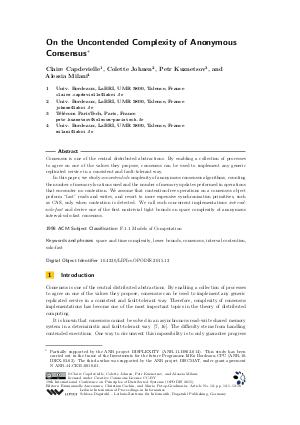On the Uncontended Complexity of Anonymous Consensus
Authors Claire Capdevielle, Colette Johnen, Petr Kuznetsov, Alessia Milani
-
Part of:
Volume:
19th International Conference on Principles of Distributed Systems (OPODIS 2015)
Part of: Series: Leibniz International Proceedings in Informatics (LIPIcs)
Part of: Conference: International Conference on Principles of Distributed Systems (OPODIS) - License:
 Creative Commons Attribution 3.0 Unported license
Creative Commons Attribution 3.0 Unported license
- Publication Date: 2016-10-13
File

PDF
LIPIcs.OPODIS.2015.12.pdf
- Filesize: 0.66 MB
- 16 pages
Document Identifiers
Subject Classification
Keywords
- space and time complexity
- lower bounds
- consensus
- interval contention
- solo-fast
Metrics
- Access Statistics
-
Total Accesses (updated on a weekly basis)
0PDF Downloads0Metadata Views
Abstract
Consensus is one of the central distributed abstractions. By enabling a collection of processes to agree on one of the values they propose, consensus can be used to implement any generic replicated service in a consistent and fault-tolerant way. In this paper, we study uncontended complexity of anonymous consensus algorithms, counting the number of memory locations used and the number of memory updates performed in operations that encounter no contention. We assume that contention-free operations on a consensus object perform "fast" reads and writes, and resort to more expensive synchronization primitives, such as CAS, only when contention is detected. We call such concurrent implementations interval-solo-fast and derive one of the first nontrivial tight bounds on space complexity of anonymous interval-solo-fast consensus.
Cite As Get BibTex
Claire Capdevielle, Colette Johnen, Petr Kuznetsov, and Alessia Milani. On the Uncontended Complexity of Anonymous Consensus. In 19th International Conference on Principles of Distributed Systems (OPODIS 2015). Leibniz International Proceedings in Informatics (LIPIcs), Volume 46, pp. 12:1-12:16, Schloss Dagstuhl – Leibniz-Zentrum für Informatik (2016)
https://doi.org/10.4230/LIPIcs.OPODIS.2015.12
BibTex
@InProceedings{capdevielle_et_al:LIPIcs.OPODIS.2015.12,
author = {Capdevielle, Claire and Johnen, Colette and Kuznetsov, Petr and Milani, Alessia},
title = {{On the Uncontended Complexity of Anonymous Consensus}},
booktitle = {19th International Conference on Principles of Distributed Systems (OPODIS 2015)},
pages = {12:1--12:16},
series = {Leibniz International Proceedings in Informatics (LIPIcs)},
ISBN = {978-3-939897-98-9},
ISSN = {1868-8969},
year = {2016},
volume = {46},
editor = {Anceaume, Emmanuelle and Cachin, Christian and Potop-Butucaru, Maria},
publisher = {Schloss Dagstuhl -- Leibniz-Zentrum f{\"u}r Informatik},
address = {Dagstuhl, Germany},
URL = {https://drops.dagstuhl.de/entities/document/10.4230/LIPIcs.OPODIS.2015.12},
URN = {urn:nbn:de:0030-drops-66034},
doi = {10.4230/LIPIcs.OPODIS.2015.12},
annote = {Keywords: space and time complexity, lower bounds, consensus, interval contention, solo-fast}
}
Author Details
References
- James Aspnes and Faith Ellen. Tight bounds for adopt-commit objects. Theory of Computing Systems, 55(3):451-474, 2014. URL: http://dx.doi.org/10.1007/s00224-013-9448-1.
-
Hagit Attiya, Rachid Guerraoui, Danny Hendler, and Petr Kuznetsov. The complexity of obstruction-free implementations. J. ACM, 56(4), 2009.

- Zohir Bouzid, Pierre Sutra, and Corentin Travers. Anonymous agreement: The janus algorithm. In Principles of Distributed Systems - 15th International Conference, OPODIS 2011, Toulouse, France, December 13-16, 2011. Proceedings, pages 175-190, 2011. URL: http://dx.doi.org/10.1007/978-3-642-25873-2_13.
-
Harry Buhrman, Juan A. Garay, Jaap-Henki Hoepman, and Mark Moir. Long-lived renaming made fast. In Proceedings of the Fourteenth Annual ACM Symposium on Principles of Distributed Computing, PODC'95, pages 194-203, 1995.

-
Claire Capdevielle, Colette Johnen, Petr Kuznetsov, and Alessia Milani. Brief Announcement: On the Uncontended Complexity of Anonymous Consensus. In DISC, October 2015.

-
Faith Fich, Maurice Herlihy, and Nir Shavit. On the space complexity of randomized synchronization. J. ACM, 45(5):843-862, September 1998.

-
Michael J. Fischer, Nancy A. Lynch, and Michael S. Paterson. Impossibility of distributed consensus with one faulty process. Journal of the ACM, 32(2):374-382, April 1985.

-
Rati Gelashvili. On the Optimal Space Complexity of Consensus for Anonymous Processes. In DISC, October 2015.

- George Giakkoupis, Maryam Helmi, Lisa Higham, and Philipp Woelfel. An o(sqrt n) space bound for obstruction-free leader election. In Distributed Computing - 27th International Symposium, DISC 2013, Jerusalem, Israel, October 14-18, 2013. Proceedings, pages 46-60, 2013. URL: http://dx.doi.org/10.1007/978-3-642-41527-2_4.
- Rachid Guerraoui and Eric Ruppert. Anonymous and fault-tolerant shared-memory computing. Distributed Computing, 20(3):165-177, 2007. URL: http://dx.doi.org/10.1007/s00446-007-0042-0.
- Vassos Hadzilacos and Sam Toueg. On deterministic abortable objects. In Proceedings of the 2013 ACM Symposium on Principles of Distributed Computing, PODC'13, pages 4-12, New York, NY, USA, 2013. ACM. URL: http://dx.doi.org/10.1145/2484239.2484241.
-
Maurice Herlihy. Wait-free synchronization. ACM Transactions on Programming Languages and Systems, 13(1):123-149, January 1991.

-
Maurice Herlihy, Victor Luchangco, and Mark Moir. Obstruction-free synchronization: Double-ended queues as an example. In ICDCS, pages 522-529, 2003.

-
Maurice Herlihy and Jeannette M. Wing. Linearizability: A correctness condition for concurrent objects. ACM Trans. Program. Lang. Syst., 12(3):463-492, 1990.

-
Leslie Lamport. A fast mutual exclusion algorithm. ACM Trans. Comput. Syst., 5(1):1-11, January 1987.

-
M.C. Loui and H.H. Abu-Amara. Memory requirements for agreement among unreliable asynchronous processes. Advances in Computing Research, 4:163-183, 1987.

- Victor Luchangco, Mark Moir, and Nir Shavit. On the uncontended complexity of consensus. In FaithEllen Fich, editor, Distributed Computing, volume 2848 of Lecture Notes in Computer Science, pages 45-59. Springer Berlin Heidelberg, 2003. URL: http://dx.doi.org/10.1007/978-3-540-39989-6_4.
- Mark Moir and James H. Anderson. Wait-free algorithms for fast, long-lived renaming. Sci. Comput. Program., 25(1):1-39, October 1995. URL: http://dx.doi.org/10.1016/0167-6423(95)00009-H.
